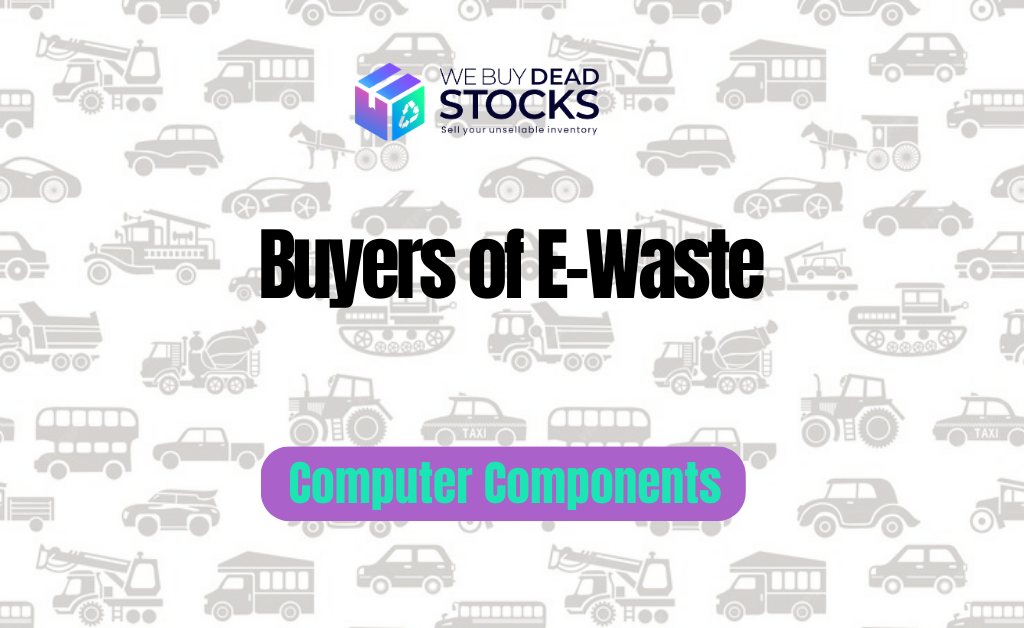In a world where technology advances at an exponential pace, the lifespan of electronic devices seems to shrink with each passing year. What was once cutting-edge quickly becomes obsolete, leaving a trail of discarded gadgets and components in its wake. However, amidst this flurry of innovation and disposal lies a hidden opportunity for sustainability and resource conservation. Enter the realm of e-waste buyers – a niche yet crucial market segment dedicated to salvaging, refurbishing, and repurposing electronic computer components, including used desktops, laptops, and various computer parts.
Understanding E-Waste 🔄
What’s E-Waste?
E-waste, short for electronic waste, refers to old or unwanted electronic devices such as computers, smartphones, and tablets. When people don’t need these devices anymore, they often throw them away, which can cause harm to the environment. A lot of computer scrap buyers in Dubai are working on this issue but the collective efforts of everyone are needed.
Why It’s Bad for Earth
When electronic devices end up in landfills, they can leak harmful substances like lead, mercury, and cadmium into the soil and water. These chemicals can pollute the environment, harm wildlife, and even make people sick when exposing themselves to it.
Stuff Inside Computers
Computers contain various components, each with its own set of materials. For example, screens may contain toxic mercury, batteries can have lead or lithium, and circuit boards often contain heavy metals like cadmium and chromium.
Lots of E-Waste Everywhere
Around the world, millions of tons of electronic waste comes up each year. In places like Dubai, where there’s a high demand for the latest electronics, the problem of e-waste is particularly acute. Many people buy new devices regularly, leading to a constant stream of old electronics and more wholesale buyers in the UAE.
Challenges of Getting Rid of E-Waste
Dealing with e-waste is challenging for several reasons. First, many electronic devices and used desktops are made up of complex materials that are difficult to recycle. Second, there’s often a lack of proper recycling infrastructure in place to handle e-waste safely. Third, there’s a need for better regulation and enforcement to ensure that e-waste is disposed of responsibly.
Benefits of Buying E-Waste Computer Components and Used Electronics 🖥️
Environmental Benefits:
- Reduction of Electronic Waste: Buying e-waste computer components and used electronics contributes to the reduction of electronic waste. Instead of discarding old devices, which often end up in landfills, recycling is the better option. This helps conserve valuable resources and reduces the environmental impact associated with electronic waste disposal.
- Conservation of Resources: By purchasing e-waste computer components and used electronics, we can conserve precious resources such as metals, plastics, and rare earth elements. These materials are often mined from the earth at significant environmental cost, including habitat destruction and pollution. Reusing these materials through recycling or refurbishment helps lessen the demand for new resources, thereby reducing the environmental strain of resource extraction.
Economic Benefits:
- Cost Savings: One of the primary economic benefits of buying e-waste computer components and used electronics is cost savings. These items are typically available at lower prices, making them an attractive option for budget-conscious buyers. Whether purchasing for personal use or business needs, buying e-waste computer components and used desktops can result in significant cost savings over time.
- Potential for Refurbishment and Resale: Another economic benefit is the potential for refurbishment and resale of e-waste computer components and used electronics. Many electronics can be repaired, upgraded, or refurbished to extend their lifespan and functionality. This not only reduces waste but also creates opportunities for businesses to generate income through resale of refurbished products. Additionally, refurbishment can create jobs in the repair and recycling industries, contributing to economic growth and job creation.
Risks and Considerations 🔍
Quality Assurance:
- Assessing Condition and Functionality: When purchasing e-waste computer components and used electronics, it’s essential to assess their condition and functionality. While some items may be in good working order, others may have defects or damage that affect their performance. Computer scrap buyers in Dubai should inspect the items carefully, checking for signs of wear and tear, damage, or malfunction. Testing electronic components, such as processors, memory modules, and hard drives, can help ensure their reliability and performance.
Compatibility:
- Ensuring Compatibility: Another consideration when buying e-waste computer components and used electronics is compatibility. Computer components such as processors, memory, and graphics cards must be compatible with existing systems to ensure proper functionality. Wholesale buyers in the UAE should verify compatibility specifications, including form factor, socket type, interface standards, and operating system requirements, to avoid compatibility issues and ensure seamless integration with their systems.
Warranty and Return Policies:
- Understanding Protections: Before purchasing e-waste computer components and used desktops, it’s essential to understand the available warranty and return policies. While some sellers may offer limited warranties or return policies for used electronics, others may sell items “as-is,” without any guarantees or protections. Buyers should carefully review the terms and conditions of warranty coverage, including duration, coverage limitations, and exclusions. Additionally, understanding the seller’s return policies, including eligibility criteria, return process, and any associated costs, can help mitigate risks and provide recourse in case of dissatisfaction or issues with the purchased items.
Conclusion
In today’s fast-paced technological landscape, the issue of electronic waste (e-waste) looms large, presenting significant environmental challenges. However, within this challenge lies an opportunity for positive change, and e-waste buyers play a crucial role in this transformation. By salvaging, refurbishing, and repurposing used electronics and computer components, these buyers contribute to sustainability efforts on multiple fronts.
Through understanding the environmental impact of e-waste, including its harmful effects on soil, water, and human health, e-waste buyers recognize the urgency of their mission. They work to reduce electronic waste by giving old devices a new lease on life, thus minimising the strain on our planet’s resources and ecosystems.
However, e-waste buyers must also navigate risks and considerations inherent in their industry. Quality assurance, compatibility issues, and warranty and return policies are all crucial factors to address to ensure a positive purchasing experience and uphold consumer confidence.In conclusion, e-waste buyers stand at the forefront of a sustainable future, turning challenges into opportunities and driving positive change in our consumption patterns. By supporting these efforts and making informed decisions, individuals and businesses can contribute to a cleaner, greener planet for generations to come.





